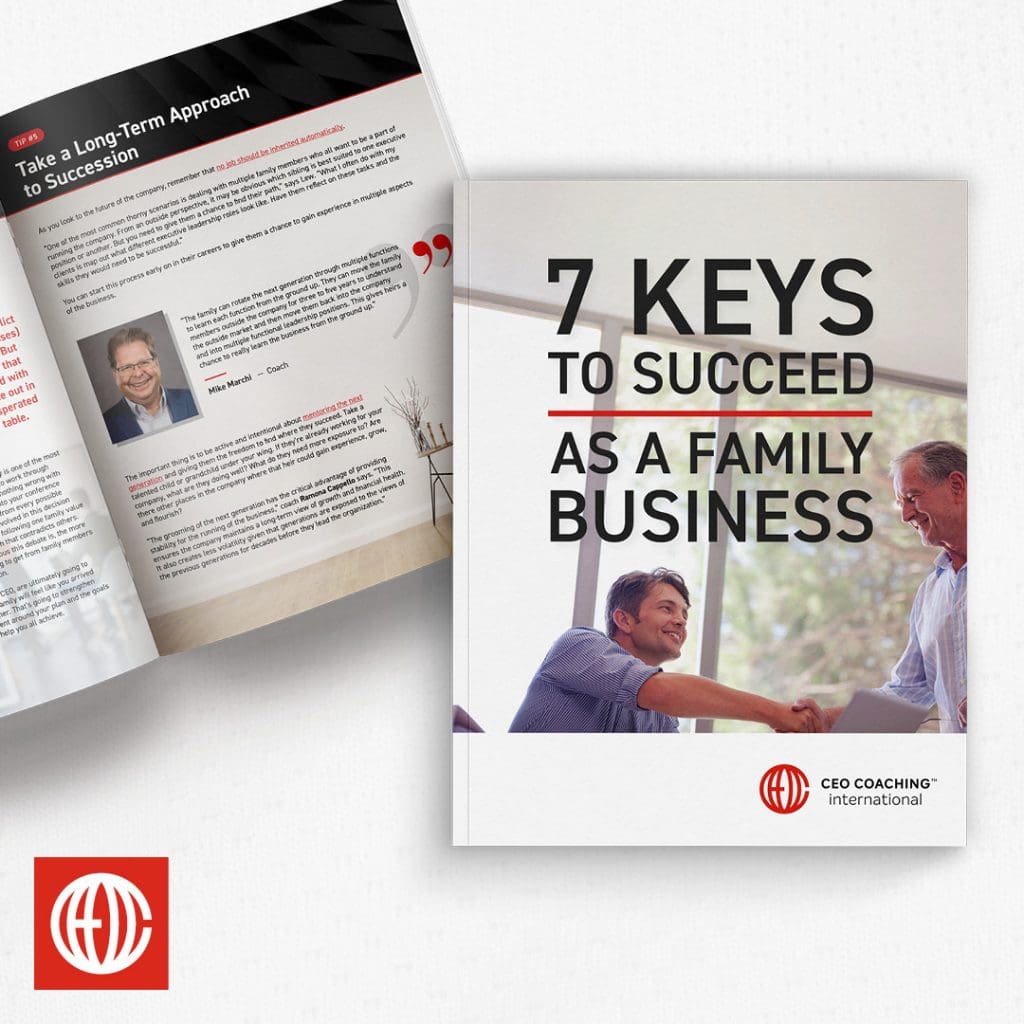
3 Ways Family Businesses Can Set Boundaries
Are you a family business, or a business owned by a family?
One of the greatest challenges of a family business is how intertwined the personal and professional get when you’re working alongside the people who changed your diaper and were there for every holiday pageant. But when it comes to BIG business decisions, the more you can separate them, the better.
It’s common for family-run organizations to “just get things done” without the same kind of structure or guidelines in place that other organizations use to make sure everything runs smoothly. Adding these kinds of explicit boundaries can make work and life easier for everyone.
Here’s how family businesses can set strong boundaries so they can succeed personally and professionally:
1. Formalize the separation between “family” and “business”
Separating family and business is easier said than done, especially in moments of crisis or during succession planning. Coach Lew Jaffe recommends setting up two different governance groups in your organization:
- Family Business Council: This governance group deals with the “family” types of questions about the future of the business. Why does sibling A get more shares than sibling B? Which sibling should be CEO and which should be CFO? What kind of dividends do we pay sibling C, who doesn’t want to be a part of the business at all?
- Organizational Alignment Council: This governance group deals with what the organization needs to look like to be successful in the future as a business. What is the definition of success for the business? What action steps need to be taken to get there?
“For many clients, this is an a-ha moment,” says Lew. “The idea of a ‘family business’ makes sense at a certain size and scale, but…you may want to dial back the ‘family’ aspect and focus more on the ‘business’ aspect [at certain times].”
2. Draft a Family Constitution
Everyone wants to hit the BIG five-year growth target. Everyone wants to improve the product so it helps more customers. Everyone wants to see those dollar bills roll in.
What’s harder? Finding the “how.”
That’s where your values come in. How do we treat our customers? How do we expect our employees to interact with each other? How do we want to impact our community? How might Grandpa have tackled this decision if he had made it 50 years ago?
The stronger your family’s values are intertwined with how you do business, the easier it will be to navigate turning points in ways that are consistent with your family’s history.
Consider drafting a Family Constitution to formalize those values. A family constitution can come in many forms, but generally, the CEO asks family members to share their perspectives on how the business should exhibit family history and values. The CEO can then connect these ideas into a unifying vision for where the company is coming from, where it wants to go, and what values the family will use to guide its key decisions.
3. Work with an expert
Don’t be afraid to look for some outside help, whether that means assembling a board of advisors your family will listen to or working with a CEO coach who will hold you accountable to the business above all else. A board of directors or a steering committee composed of non-family members can keep the family at every level of the business focused on the key tasks that the company needs to execute.
“If you’re not going to create an environment that creates a feeling of equality and respect for people who aren’t family members, there is no way you’re going to optimize your potential as a business,” says coach Sheldon Harris. “The more we can begin to get the family business to operate more like a business than a family, the more objectivity we’re going to bring into the equation.”
Whether it’s transitioning from one generation to the next, navigating sibling rivalry or divorce proceedings, or addressing business issues like cash flow or staffing, no two family businesses are alike. And no matter how skilled and considerate a CEO is, it’s nearly impossible to keep all of a family’s business out of a family-run business. That’s why hiring a coach can be one of the best decisions you’ll ever make. Learn more >
Learn more with our free eBook, 7 Keys to Succeed as a Family Business
This seven-step playbook is designed to help you get your family business to succeed. It’s filled with the wisdom and insights from our world-class coaches, many of whom grew up in family businesses of their own.
Download the free ebook>>
About CEO Coaching International
CEO Coaching International works with CEOs and their leadership teams to achieve extraordinary results quarter after quarter, year after year. Known globally for its success in coaching growth-focused entrepreneurs to meaningful exits, CEO Coaching International has coached more than 1,000 CEOs and entrepreneurs in more than 60 countries and 45 industries. The coaches at CEO Coaching International are former CEOs, presidents, or executives who have made BIG happen. The firm’s coaches have led double-digit sales and profit growth in businesses ranging in size from startups to over $10 billion, and many are founders that have led their companies through successful eight, nine, and ten-figure exits. Companies working with CEO Coaching International for two years or more have experienced an average revenue CAGR of 31% (2.6X the U.S. average) and an average EBITDA CAGR of 52.3% (more than 5X the U.S. average).
Learn more about executive coaching | Meet our world-class coaches






